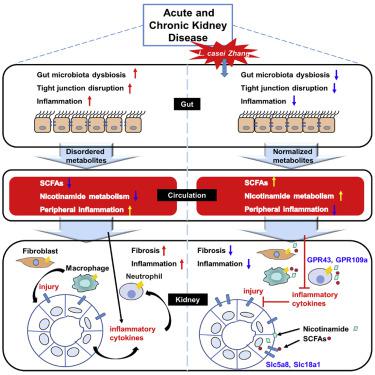Cell Metabolism ( IF 29.0 ) Pub Date : 2021-07-15 , DOI: 10.1016/j.cmet.2021.06.014 Han Zhu 1 , Chujin Cao 1 , Zhongcai Wu 1 , Heping Zhang 2 , Zhihong Sun 2 , Meng Wang 1 , Huzi Xu 1 , Zhi Zhao 1 , Yuxi Wang 1 , Guangchang Pei 1 , Qian Yang 1 , Fengming Zhu 1 , Juan Yang 1 , Xuan Deng 1 , Yu Hong 1 , Yinzheng Li 1 , Jie Sun 3 , Fan Zhu 1 , Mengxia Shi 1 , Kun Qian 1 , Ting Ye 3 , Xuezhi Zuo 3 , Fenfei Zhao 4 , Jing Guo 4 , Gang Xu 1 , Ying Yao 5 , Rui Zeng 1

|
The relationship between gut microbial dysbiosis and acute or chronic kidney disease (CKD) is still unclear. Here, we show that oral administration of the probiotic Lactobacillus casei Zhang (L. casei Zhang) corrected bilateral renal ischemia-reperfusion (I/R)-induced gut microbial dysbiosis, alleviated kidney injury, and delayed its progression to CKD in mice. L. casei Zhang elevated the levels of short-chain fatty acids (SCFAs) and nicotinamide in the serum and kidney, resulting in reduced renal inflammation and damage to renal tubular epithelial cells. We also performed a 1-year phase 1 placebo-controlled study of oral L. casei Zhang use (Chinese clinical trial registry, ChiCTR-INR-17013952), which was well tolerated and slowed the decline of kidney function in individuals with stage 3–5 CKD. These results show that oral administration of L. casei Zhang, by altering SCFAs and nicotinamide metabolism, is a potential therapy to mitigate kidney injury and slow the progression of renal decline.


























 京公网安备 11010802027423号
京公网安备 11010802027423号